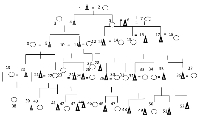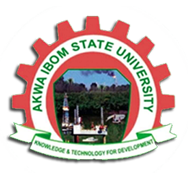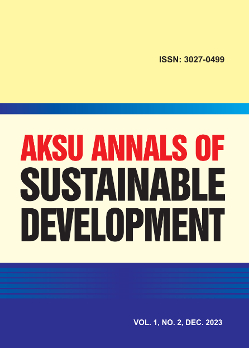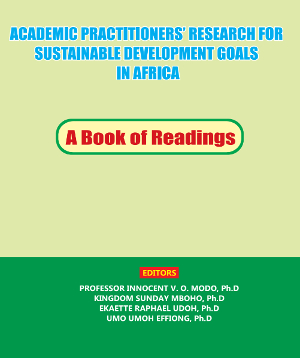INTERGENERATIONAL FAMILIES AND NIGERIAN SUSTAINABLE DEVELOPMENT
Abstract
INTRODUCTION
The family is undoubtedly the building block of society. Every identifiable community in Nigerian begins on the nuclear and lineage basis and matures into an identifiable community (Modo, 2016). Most Nigerian and African families are patrilineal and marriage stability is mostly associated with this cultural family system. According to Max Gluckman in his Divorce hypothesis (Gluckman, 1953), the
patrilineal family system witnesses a fewer marriage divorces than the bilateral and matrilineal family systems. This is because of the inbuilt cultural norms of genetricial and uxorial rights, a cultural system that has become intergenerational. The family types in the patrilineal system depend on the socio-cultural system adopted by each cultural group. The nuclear family naturally increases to
compound as husband takes more wives and ultimately to joint family system as children get married and dwell beside the epic ancestor patrilocally (Modo, 2016). This socio-cultural structure in three generations becomes an indelible lineage which when this ancestral tree becomes hazy because of several generations and as epic ancestors‟ descriptions almost feasle into the thin air, we talk of clans
and even moiety. A typical illustration of this could be found in figure 1 as Appendix I. The structure and functions of the intergenerational family mature ongoing depending on the unique cultural system and the deepened enculturation. This issue has been addressed in the traditional marital arrangements and processes in Nigeria (Modo, 1999).
The issue of family development in Nigeria should be taken seriously considering the fact that the family is the building block of society. The problem of family development in a post-colonial Nigeria is the problem of competing acculturated diffused non-indigenous educational system which the new generations of adults and youths believe is the way forward. These are the extraneous variables that mostly conflict with the traditional educational methods in homes and work places (Fafunwa, 1976).
Downloads
References
Andre, Gender Frank (1969). Capitalism and Underdevelopment in Latin America. England: Penguin Books.
Adewumi, A. A. (1987). Intergenerational Change in Family Size among the Urban Residents in Ibadan, Nigeria. Gennaio-Guigno, Vol.43, No.1/2 Universita, Degli studi di Roma “La Sapienza”
Agupusi, P. (2019). The effect of Parents education appreciation on Intergenerational Inequality International Journal of Educational Development. Elsevier Vol.66 (C) pp.214-222.
Ahaiwe, S. C. (1997). Marital Arrangements and Processes in Nigeria. In Onwuka, J. O., Ahaiwe, S. C. (eds.) Nigerian Heritage. Okigwe: Whytem Publishers (Nig.)
Akinrolie, O. (2020). Journal of Gerontological Social Work. Vol.63, Issue 5.
Andre, Gunder Frank (1966). The Development of Underdevelopment. Monthly Review, XVII.
Azimazi, Mimoh Jimoh; Olumide, Seyi and Irekamba Chris (2018). Britain urges Nigeria, others to Legalise same-sex marriage. Guardian April, 18.
Bawa, A. (2023). Economic and Financial Crimes Commission Chairman Inaugurates zero Tolerance Club at Benson Idahosa University May 3.
Chilcole, R. H. (1981). Theories of Comparative Politics: The Search for a Paradigm. Colorado: Westeried Press.
Easterlin, R. (1981). „Why isn‟t the Whole World Developed.” Journal of Economic History, March, pp.1-17.
Fabohun, O. (2021). Towards Harnessing Intergeneration Opportunities for Inclusive Growth and Development in Nigeria. 10th Convocation Lecture. Osun State University, October 4, 2021.
Fafunwa, A. Babs (1974). History of Education in Nigeria. London: George Allen and Unwin.
Ghuckman, M. (1955). Custom and Conflict in Africa. Oxford: Basil Blackwell.
Ijomah, B. I. C. (2011). Nigerian Nationalism and the problems of Socio-political Integration. Onitsha: Ohiluben Publishers Centre for Poliy Studies and Research.
Light TV Show (2022). Minister Pauline Tallen devastated after listening to Osinachi‟s Children about the death of their mother. April 16.
Mitchel, J. (1957). Aspects of African Marriage on the Copperbelt of Northern Rhodesia, Human Problems of British Central Africa, 22, pp.1-30.
Modo, I. V. O. (1995). A Handbook on Theories and Methods in Anthropology. Uyo: Dorand Publishers.
Modo, I. V. O. (2016). Issues in Anthropology, an Introductory Textbook. Issele-uku: Cultural Research Publishers.
Modo, I. V. O. (2023). Religion, Human Values and Relations among People of Living Faith. IsseleUku: Cultural Research Publishers.
Nurke, R. (1953). Problems of Capital Accumulation in Poor Countries In Meier, G. Leading Issues in Economic Development. New York: OUP (1989).
Okereke and Ekpe (2003). Development and Underdevelopment: The Politics of the North South Divide. Enugu: John-Jacob‟s Classic Publishers Ltd.
Onwuka, J. O. and Akaiwe, S. C. (eds) (1997). Nigerian Heritage. Okigwe: Whytem Publishers (Nig.)
Otite, O. and Ogionwo, W. (1979). An Introduction to Sociological Studies. Ibadan: Heinemann Educational Books (Nig.) Ltd.
Rodney, W. (1972). How Europe Underdeveloped Africa. London: Bogle “Lenverture Publication Sahara Reporters.com (2022). The report of 49 spouses reportedly died between January 2021 and March 2022 as compiled by Daily Trust. Sahara Reporters, NJ.
Sunkel, O. (1974). “Dependency: A Critical Synthesis of the Literature” Latin America Perspective (Fall)

Downloads
Published
Issue
Section
Categories
License
Copyright (c) 2024 AKSU Annals of Sustainable Development

This work is licensed under a Creative Commons Attribution-NonCommercial-NoDerivatives 4.0 International License.
Manuscript content on this site is licensed under Creative Commons Licenses. Authors wishing to include figures, tables, or text passages that have already been published elsewhere are required to obtain permission from the copyright owner(s) for both the print and online format and to include evidence that such permission has been granted when submitting their papers. Any material received without such evidence will be assumed to originate from the authors.





 ICIDR Publishing House
ICIDR Publishing House